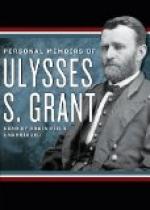The sight was varied and grand: nearly all day for two successive days, from the Capitol to the Treasury Building, could be seen a mass of orderly soldiers marching in columns of companies. The National flag was flying from almost every house and store; the windows were filled with spectators; the door-steps and side-walks were crowded with colored people and poor whites who did not succeed in securing better quarters from which to get a view of the grand armies. The city was about as full of strangers who had come to see the sights as it usually is on inauguration day when a new President takes his seat.
It may not be out of place to again allude to President Lincoln and the Secretary of War, Mr. Stanton, who were the great conspicuous figures in the executive branch of the government. There is no great difference of opinion now, in the public mind, as to the characteristics of the President. With Mr. Stanton the case is different. They were the very opposite of each other in almost every particular, except that each possessed great ability. Mr. Lincoln gained influence over men by making them feel that it was a pleasure to serve him. He preferred yielding his own wish to gratify others, rather than to insist upon having his own way. It distressed him to disappoint others. In matters of public duty, however, he had what he wished, but in the least offensive way. Mr. Stanton never questioned his own authority to command, unless resisted. He cared nothing for the feeling of others. In fact it seemed to be pleasanter to him to disappoint than to gratify. He felt no hesitation in assuming the functions of the executive, or in acting without advising with him. If his act was not sustained, he would change it—if he saw the matter would be followed up until he did so.
It was generally supposed that these two officials formed the complement of each other. The Secretary was required to prevent the President’s being imposed upon. The President was required in the more responsible place of seeing that injustice was not done to others. I do not know that this view of these two men is still entertained by the majority of the people. It is not a correct view, however, in my estimation. Mr. Lincoln did not require a guardian to aid him in the fulfilment of a public trust.




